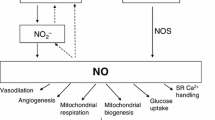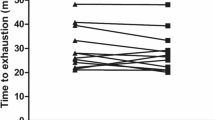Abstract.
The effects of hydromineral hormones and catecholamines on renal water and electrolyte excretion were examined during and after dehydration induced by either passive heat or exercise. Eight healthy young Caucasian subjects participated in three separate trials, each including three consecutive phases. Phases 1 and 3 involved a 90-min period at rest in a thermoneutral environment, while phase 2 involved a 120-min period designed to provide: (1) euhydration (control trial), (2) passive heat-induced dehydration of 2.8% body mass, or (3) exercise-induced dehydration of 2.8% body mass. During the two dehydration procedures, the decreases in urine flow and sodium excretion were more marked during exercise (P<0.05). An increase in plasma catecholamines occurred only during exercise, together with a reduction in creatinine clearance and more marked increases in plasma renin and aldosterone than during passive heat exposure (P<0.05). Although plasma vasopressin was elevated during the two dehydration procedures, urine osmolality did not change and, moreover, free water clearance increased during exercise (P<0.05). Plasma levels of atrial natriuretic peptide increased markedly only during exercise compared to the other trials (P<0.05). After the dehydration procedures, urine flow decreased again and urine osmolality increased markedly (P<0.05), while plasma vasopressin remained elevated. These results suggest that sympatho-adrenal activation during exercise plays a major role in the more marked reduction in diuresis and natriuresis than during passive heat exposure. Despite high plasma vasopressin concentrations during the two dehydrating events, the observed antidiuresis was not due to an increased renal concentrating ability, and the vasopressin was more effective after the dehydration procedures.
Similar content being viewed by others
Author information
Authors and Affiliations
Additional information
Electronic Publication
Rights and permissions
About this article
Cite this article
Melin, B., Koulmann, N., Jimenez, C. et al. Comparison of passive heat or exercise-induced dehydration on renal water and electrolyte excretion: the hormonal involvement. Eur J Appl Physiol 85, 250–258 (2001). https://doi.org/10.1007/s004210100448
Accepted:
Issue Date:
DOI: https://doi.org/10.1007/s004210100448




